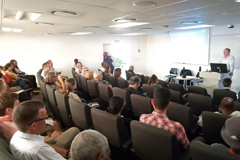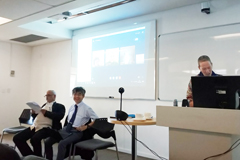Discussion on Social Cohesion in Africa at a Book Launch Seminar in South Africa
2020.04.10
The JICA Ogata Sadako Research Institute for Peace and Development and the University of Cape Town jointly hosted a seminar to celebrate the launch of a book titled “From Divided Pasts to Cohesive Futures: Reflections on Africa” at the University of Cape Town on Feb. 20, 2020. The book is the third major outcome of a joint research project by the JICA Ogata Research Institute and Kobe University called “Ethnic Diversity and Economic Instability in Africa.”
The book consists of 13 chapters written by over 20 historians, economists, and political scientists in total, edited by Hino Hiroyuki, a visiting research scholar at Duke University (a former professor at Kobe University and a visiting scholar at the University of Cape Town); Arnim Langer, professor at KU Leuven; John Lonsdale, professor emeritus at the University of Cambridge; and Frances Stewart, professor emeritus at the University of Oxford. The book looks back at the history of social cohesion in Africa’s multiethnic societies and offers prospects for the future.
This seminar, which followed the launch celebration seminar hosted in Japan in November 2019, discussed social cohesion from a variety of perspectives: race and ethnicity, history, economics, politics, and society, with a particular focus on South Africa under the title “Messages for South Africa.” About 60 people participated, including the book’s authors as well as researchers and students.
The seminar opened with an introductory overview of the book by Lonsdale. He emphasized three points: (1) ethnic identity, which has been regarded as an “original sin” in Africa, is in fact permeable, changeable, and can be inclusive; we can expect that seemingly deeply entrenched exclusive ethnic identity and resulting distrust may change in the future. (2) Afro-pessimism, which regards social cohesion in Africa as impossible is incorrect, and countries worldwide have much to learn from African experience, and (3) a bottom-up approach has much greater potential for building social cohesion, and that the role of civil society will increase in importance.

John Lonsdale, professor emeritus at the University of Cambridge, gave an introductory overview of the book
The keynote address was delivered by Stanley Henkeman, executive director of the Institute for Justice and Reconciliation, a think tank that has been tackling the issue of social cohesion in South Africa for years. He started the lecture by pointing out that, for the due estimation of the severity of the challenge to achieve social coherence in South Africa, it is critically important to recall the “distant past” of the colonial period in which de-humanization of indigenous people by the Western colonizers took place. According to him, the resultant deeply entrenched attitude and unquestioned beliefs are still the “default” in the country. Then he proposed what should be done in the future to depart from the exclusive past and to make a “precarious journey” to the inclusive future. According to him, it is necessary to problematize hidden aspects of politics, problematize taken-for-granted economic discourses, and face uncomfortable things. “Don’t be afraid of taking bold steps, no matter how uncertain the future is,” he said.
The panel discussion that followed included a lively discussion involving the floor that was moderated by Justine Burns, an associate professor at the University of Cape Town. Shiga Hiroaki, an executive senior research fellow at the JICA Ogata Research Institute who was on stage as one of the four panelists, commented on the role of land reform in achieving social cohesion in South Africa. When asked what measures were needed besides land reform in order to rectify unequal land distribution, he responded that a property tax and a ceiling on maximum land ownership are under consideration, but that no measures have been adopted. He also pointed out that land reform has been painfully slow, due to the necessity to take mutually-contradicting considerations into account, such as distributive justice, political stability, food security, and economic growth.

Shiga Hiroaki, executive senior research fellow at the JICA Ogata Research Institute (center), took part in the panel discussion
During the closing session, Hino and Stewart commented on the discussions that had taken place during the seminar. Hino emphasized the importance of analyzing social cohesion not only from an objective macro-economic perspective, such as the Gini coefficient, but also from a perspective of subjective inequality as perceived by the people in the workplace and other aspects of their daily lives. He also underlined the importance of trust among the people to avoid the “tragedy of the commons”, and proposed the research to investigate how a measure like Kaizen can enhance workers’ trust and corporate cohesion. He concluded by saying that social cohesion will lead to productivity improvements and thus enrich people’s lives. Stewart pointed out the danger of horizontal inequality that destroys trust between people and entrenches exclusive identity, based on the comparative analysis of polyethnic states struggling to achieve social cohesion. She also noted that social cohesion is complex in nature and difficult to maintain, and stressed how important it is for citizens to continue monitoring their government’s policies.
Lastly, Professor Murray Leibbrandt of the University of Cape Town and Shiga gave summaries of the discussions to conclude the seminar.

事業事前評価表(地球規模課題対応国際科学技術協力(SATREPS)).国際協力機構 地球環境部 . 防災第一チーム. 1.案件名.国 名: フィリピン共和国.

事業事前評価表(地球規模課題対応国際科学技術協力(SATREPS)).国際協力機構 地球環境部 . 防災第一チーム. 1.案件名.国 名: フィリピン共和国.

事業事前評価表(地球規模課題対応国際科学技術協力(SATREPS)).国際協力機構 地球環境部 . 防災第一チーム. 1.案件名.国 名: フィリピン共和国.

事業事前評価表(地球規模課題対応国際科学技術協力(SATREPS)).国際協力機構 地球環境部 . 防災第一チーム. 1.案件名.国 名: フィリピン共和国.

事業事前評価表(地球規模課題対応国際科学技術協力(SATREPS)).国際協力機構 地球環境部 . 防災第一チーム. 1.案件名.国 名: フィリピン共和国.
scroll